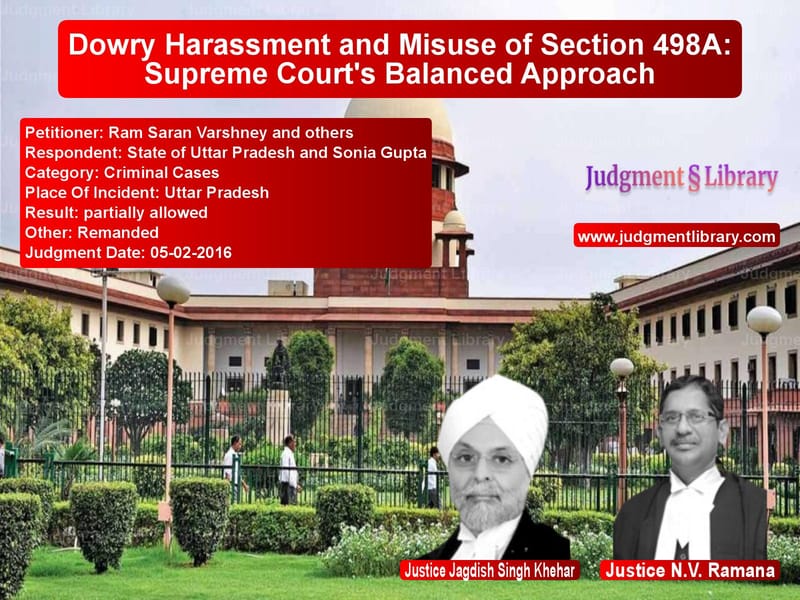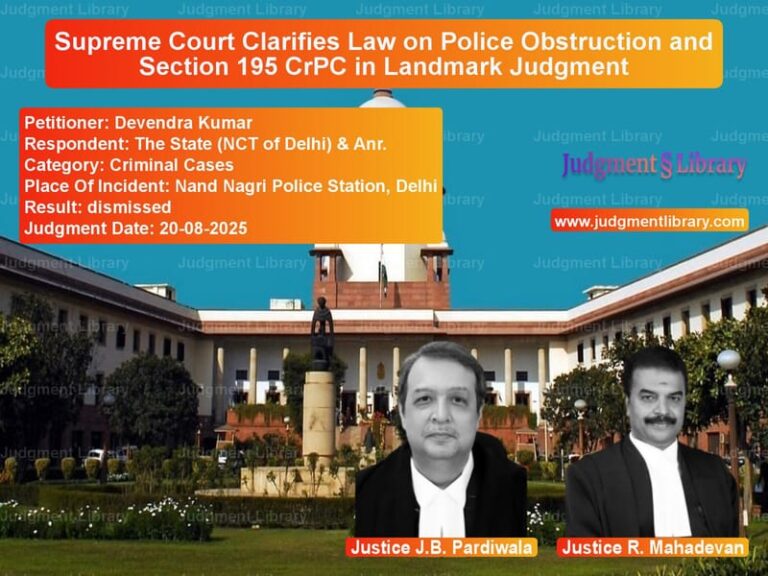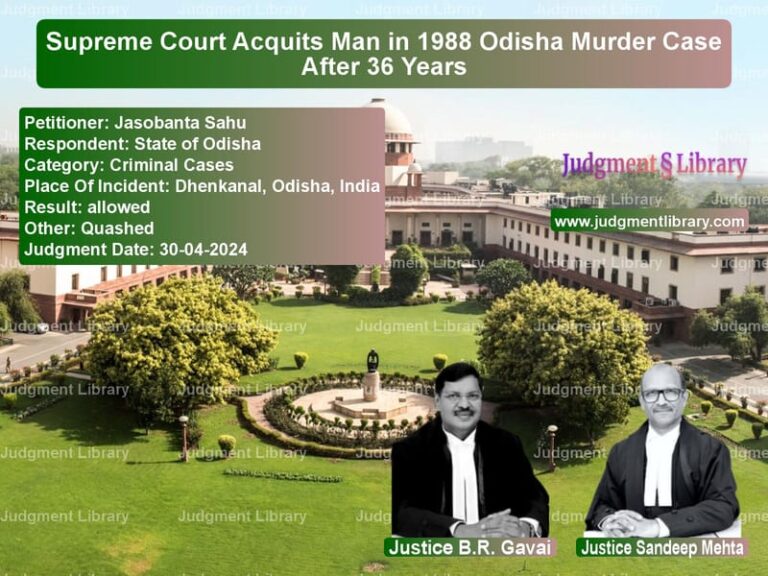Dowry Harassment and Misuse of Section 498A: Supreme Court’s Balanced Approach
The case of Ram Saran Varshney and others vs. State of Uttar Pradesh is a significant ruling concerning allegations of dowry harassment and the legal implications of Section 498A of the Indian Penal Code. The Supreme Court analyzed whether the accused were wrongfully implicated and if the case had been pursued in a just manner. The ruling underscores the importance of preventing both genuine harassment and misuse of dowry laws.
Background of the Case
The case originated from a complaint filed by Sonia Gupta, wife of Mukul Gupta, against her husband and in-laws in 2002. She alleged that she was subjected to continuous mental and physical torture for dowry, leading to her filing a First Information Report (FIR). The police registered the case under the following legal provisions:
- Section 498A IPC – Cruelty to a married woman by her husband and in-laws.
- Section 506 IPC – Criminal intimidation.
- Sections 3 and 4 of the Dowry Prohibition Act – Punishment for demanding dowry.
Legal Proceedings and Challenges
Following the FIR, the matter underwent multiple investigations. The accused, including Mukul Gupta’s parents and sisters, challenged the case on several grounds, arguing that it was a malicious attempt to harass them. Over the years, multiple closure reports were filed, yet the case persisted.
Petitioner’s (Accused’s) Arguments
The accused, including Mukul Gupta and his family, raised the following key arguments:
- The allegations were fabricated due to matrimonial discord rather than actual dowry harassment.
- There were three previous closure reports in the case, indicating that the investigating authorities did not find enough evidence against them.
- The sisters-in-law, who were married and lived separately, were falsely implicated.
- The complainant used the dowry laws as a weapon rather than a shield to harass the accused.
- The fresh charge sheet was filed after undue pressure on the police, even though earlier investigations had exonerated them.
Respondent’s (Wife’s) Arguments
The complainant, Sonia Gupta, countered with the following points:
- She had faced severe mental and physical harassment for not bringing adequate dowry.
- The closure reports were biased and failed to capture the full extent of her suffering.
- The accused manipulated legal loopholes to evade justice.
- She was forced to file multiple complaints because the authorities did not take her case seriously.
High Court’s Observations
The Allahabad High Court upheld the trial proceedings and refused to quash the charge sheet against the accused. The accused then approached the Supreme Court seeking relief.
Supreme Court’s Judgment
On February 5, 2016, the Supreme Court, comprising Justices Jagdish Singh Khehar and N.V. Ramana, delivered its judgment. The key takeaways from the ruling were:
1. Validity of Multiple Closure Reports
- The Court noted that three closure reports had been filed, indicating that there was insufficient evidence to prosecute the accused.
- The police failed to provide fresh evidence in the new charge sheet, making its legality questionable.
2. Protection of Innocent Family Members
- The Supreme Court quashed the proceedings against the sisters-in-law, emphasizing that married sisters living separately should not be dragged into such disputes without strong evidence.
- The Court stressed that misuse of Section 498A should not lead to innocent family members facing undue harassment.
3. Continuation of Trial Against Husband and Parents-in-Law
- While the charges against the sisters-in-law were dropped, the Court allowed the trial against the husband and parents-in-law to continue.
- The Court instructed the trial court to expedite proceedings and conclude the case without unnecessary delays.
4. Importance of Due Process
- The Supreme Court emphasized that legal proceedings must follow due process and should not be influenced by vindictive motives.
- The judgment highlighted that both victims and the accused deserve a fair trial.
Key Legal Takeaways
- Balanced Approach to Dowry Cases: The ruling recognizes the reality of dowry harassment while ensuring that innocent family members are not wrongfully implicated.
- Judicial Oversight on Investigations: Courts must scrutinize whether investigations are conducted fairly and ensure that multiple closure reports are not ignored without valid reasons.
- Safeguarding Women’s Rights: The ruling underscores the importance of protecting genuine victims of dowry harassment and ensuring justice is served.
- Preventing Misuse of Section 498A: The judgment warns against the misuse of dowry laws to settle personal scores and ensures that accused individuals are not subjected to unfair legal persecution.
- Need for Speedy Trials: The Supreme Court directed the trial court to complete the case within a reasonable time to prevent prolonged legal harassment for both parties.
Conclusion
The Supreme Court’s decision in Ram Saran Varshney vs. State of Uttar Pradesh is a landmark ruling in dowry harassment cases. It provides a balanced approach, ensuring that genuine victims receive justice while preventing the misuse of laws to falsely implicate family members. The ruling reinforces the need for judicial oversight in criminal proceedings and serves as an important precedent in matrimonial disputes.
Don’t miss out on the full details! Download the complete judgment in PDF format below and gain valuable insights instantly!
Download Judgment: Ram Saran Varshney a vs State of Uttar Prade Supreme Court of India Judgment Dated 05-02-2016-1741852561063.pdf
Direct Downlaod Judgment: Direct downlaod this Judgment
See all petitions in Fraud and Forgery
See all petitions in Dowry Cases
See all petitions in Alimony and Maintenance
See all petitions in Judgment by Jagdish Singh Khehar
See all petitions in Judgment by N.V. Ramana
See all petitions in partially allowed
See all petitions in Remanded
See all petitions in supreme court of India judgments February 2016
See all petitions in 2016 judgments
See all posts in Criminal Cases Category
See all allowed petitions in Criminal Cases Category
See all Dismissed petitions in Criminal Cases Category
See all partially allowed petitions in Criminal Cases Category







